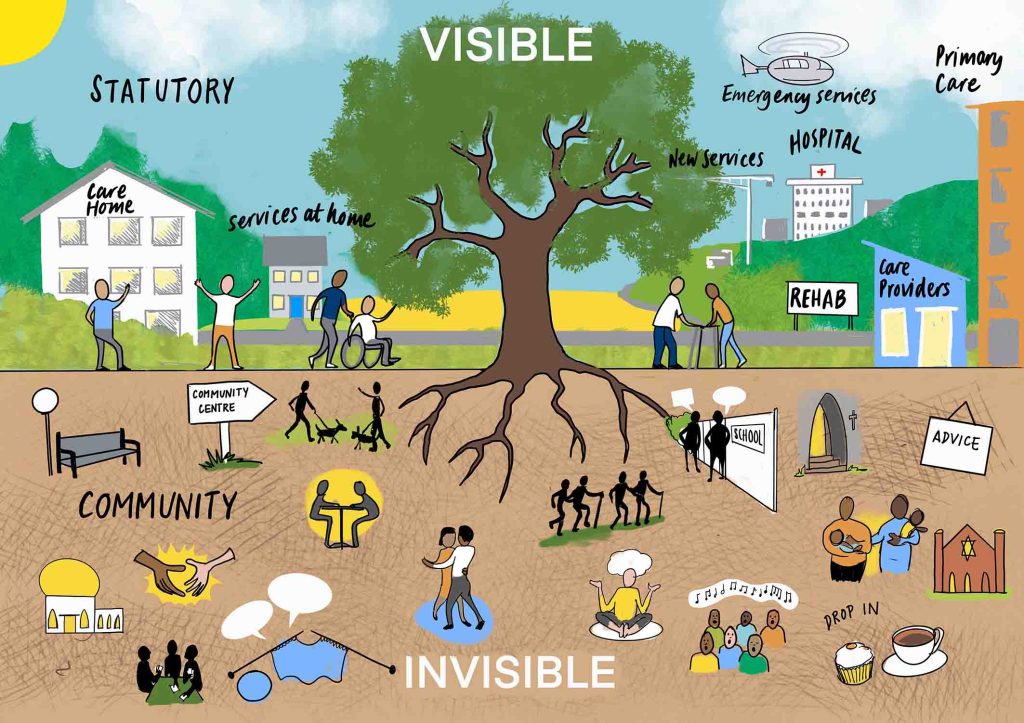
Care as a Complex, Adaptive Ecosystem
What makes social care a complex adaptive ecosystem and how can understanding this help improve care outcomes for all?
Viewing social care as an ecosystem means recognising it is a complex, adaptive, system, featuring ‘emergent’ outcomes (that are hard to control, but not random) and ‘episodic’ changes (responses to past events, internal ‘feedback loops’ and external ‘shocks’ that may lead to tipping points and change).
What’s distinctive about our approach?
- We focus on local level arrangements, recognising these are embedded in and linked to other systems.
- We focus on the wider support in people’s lives, not only publicly-funded, statutory services.
What are the advantages of a systems approach?
- In theory, systems adapt to their environment; if they can’t, in the end they cease to exist. Some variants of ‘best fit’ to current care ecosystem conditions may be ‘suboptimal’ for some groups. We explore who is affected and how this could change.
- A systems approach encourages experimentation and learning. Practitioners can be helped to work with complexity to deliver positive change, without feeling overwhelmed or disempowered.
- It can also foster new thinking about accountability and shift collective thinking away from feeling ‘nothing we can do can make the changes needed’.
Studying UK local and national systems, we focus on:
- Variations in local care ecosystem stability and effectiveness. We look at market stability, user outcomes, access to information and support, workforce retention, and ask, ‘Can we identify common system features that enable ‘best fit’ to support sustainability, equity and wellbeing?’
- Implementation of care legislation. New laws have often been poorly implemented. How can this be improved? Complexity insights highlight that policy implementation has to involve more than ‘pulling a lever’ and expecting change to happen.
- Supporting local actors to shape their strategies, we use insights about complex adaptive systems to help those involved reduce tendencies to feel overwhelmed or fatalistic.
- Major reforms of care systems, including the Integrated Care Systems designed to bring health and social care together. We aim to map and understand the effects of these changes in real time.
A flourishing social care ecosystem
An ecosystem is a metaphor from nature which we often use in social science when talking about something which is complex and interlinked, and where no one is control of the whole thing.
Here we show our visual representation of a flourishing social care ecosystem, drawn by the artist Laura Brodrick (Home – Think Big Picture). It’s developed from the idea that a flourishing system has activity both above the soil line (visible) and below the soil line (invisible).
Things like care homes and hospitals are the visible part of the system – a bit like the mammals and birds that we see in nature. The invisible parts are all the small community activities which aren’t necessarily thought of as part of social care but are like the microorganisms that make the soil rich and fertile. These are the coffee mornings, choirs, sports clubs, dance groups, faith organisations, family and neighbourhood networks which help people to have purpose and meaning.
We need both the visible and the invisible for a flourishing social care ecosystem. When one part isn’t working well it overloads the other and we end up with a degraded ecosystem, like a barren landscape where nothing grows.
In our research for the Centre for Care we are looking at what characteristics of local social care ecosystems lead to flourishing. We explore whether the features of some local systems make them more likely to be degraded and failing, and how we can support flourishing everywhere.

Commentary on Care as a Complex, Adaptive Ecosystem
Commentary pieces relating to Care as a Complex, Adaptive Ecosystem

Professor Nathan Hughes responds to the UK Government’s 2025 Spending Review in relation to children’s social care.
Read More about Can New Money Shift Old Systems? What the 2025 Spending Review Might Mean for System Change in Children’s Social Care
The Centre for Care team respond to last week’s 2025 UK government Spending Review.
Read More about Left on the Back-Burner: Adult Social Care and the 2025 Spending Review
Join us online for our next seminar on 22nd July with Dr Zhe Yan.
Read More about Seminar: Eldercare Work in Contemporary China: The Nexus of State, Family, and Market
Charlie Grosset explores the recent UK welfare reforms focusing on the emotional, social and financial impact on disabled people.
Read More about Overview of welfare reforms
Recent Publications
Members
The Care as a Complex, Adaptive Ecosystem team is led by Professor Catherine Needham at the University of Birmingham.

